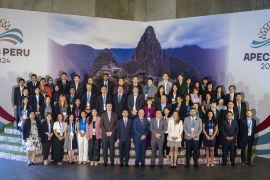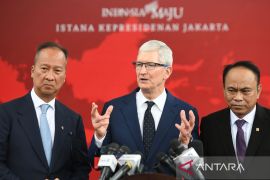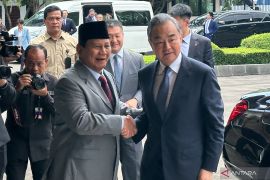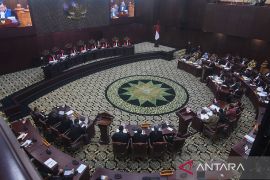Indonesias ideology is based on Pancasila and Bhineka Tunggal Ika, a Sanskrit phrase meaning Unity in Diversity, making ethic and religious pluralism protected by law.
With a pluralist society, Indonesia is a nation built on the foundation of Pancasila and Bhineka Tunggal Ika that disregards skin color, ethnicity, and faith.
These real facts about Indonesia were highlighted by the countrys Vice President Jusuf Kalla during a public lecture at the Columbia University in New York on Friday.
"We have Pancasila, as the basis of the state, and the motto of Bhineka Tungga, so religious differences are not a problem in Indonesia. Although some conflicts often occur, it is not a matter of religion but due to the problem of inequality, democracy, and even politics," Kalla explained in the public lecture.
While referring to the conflicts in Poso and Maluku several years ago, the vice president remarked that the case was precisely because of democracy.
Kalla noted that before the conflicts broke out in these areas, the leaders and people of different faiths lived in harmony, and if the regional leader was a Muslim, the representative was non-Muslim, and vice versa.
"However, suddenly after democracy, the winner in the regional elections took it all, and the regional heads ignore the harmony, and the majority takes everything or controls everything," Kalla said.
The Indonesian vice president affirmed in the public lecture at the Columbia University that radicalism and terrorism struck failed nations.
According to Kalla, radicalism and terrorism gained a stronghold in failed nations due to a sense of despair and widespread unemployment.
Further, he explained that these failed nations were the result of the US invasion as had taken place in Iraq, Syria, Lebanon, and others; and the ISIS also emerged in such countries.
The vice president revealed that in Indonesia, a deradilization program has been implemented for more than 10 thousand former terrorists who were held in 72 prisons across the country.
When speaking at the State University of Padang, West Sumatra, last July, Kalla had called on Minister of Communication and Informatics Rudiantara to track and crack down on the spread of online radicalism.
"Today, the most extreme approach to spread radicalism is through technology. Hence, the minister of communication and informatics must track its spread on the internet. We seek to pursue it together," Kalla stated at the time.
The ministry then urged internet service providers to terminate or block access to Telegrams 11 domain name systems, which were originally accessible via personal computers, as they contained content on radicalism and extremism that led to terrorism.
Kalla conveyed the request in response to the Declaration of Anti-Radicalism made by rectors of state and private universities in the provinces of West Sumatra, Jambi, and Riau.
According to Kalla, radicalism was deliberately spread among the young people through brainwashing that there was a shortcut to reach heaven by undertaking "jihad," engaging in a holy war. Hence, such a thought process cannot be fought with violence, but it should be overcome by raising awareness through the spread of education.
"Radicalism will not end by reading the joint declaration, but it has to be eradicated by providing good education and sound examples and sharing the right religious teachings, which is why the university plays an important role in neutralizing and channeling the thought process of our young generation in the right direction," the vice president said at the time.
Speaking in connection with the misuse of technology for the spread of radicalism that had led to terrorism, Kalla appealed to the young generation in Indonesia, especially students of the State University, to study hard.
"If people get influenced without the right knowledge, their actions will spiral out of control. If they are knowledgeable, they will move in the right direction. Hence, let us continue to advance the level of education since it is also part of jihad," he stated.
To counter the threats of extremism and terrorism, Foreign Affairs Minister Retno Marsudi has noted that root causes, such as the development gap, unemployment, and job inequality, among others, need to be addressed.
She affirmed that this inclusive development will bring prosperity to all, and no one will be left behind.
Indonesia is the worlds most populous Muslim-majority country, with nearly 90 percent of its population are Muslims.(*)
Reporter: Otniel Tamindael
Editor: Heru Purwanto
Copyright © ANTARA 2017











